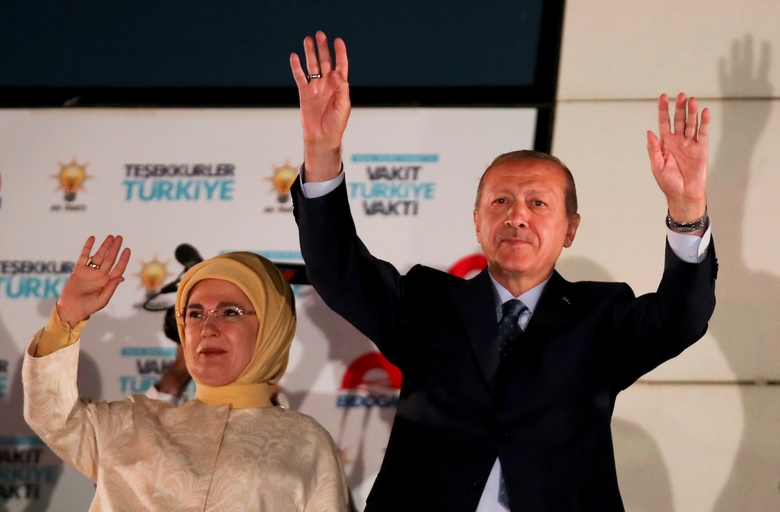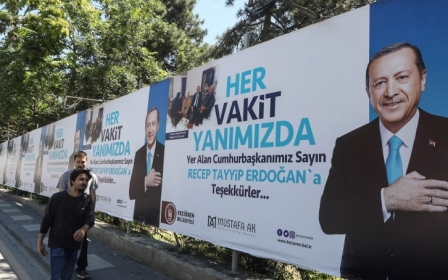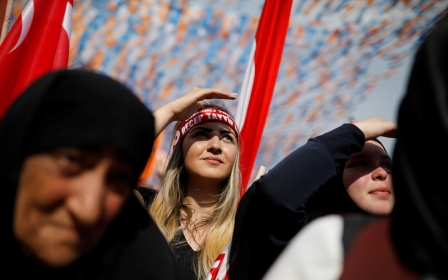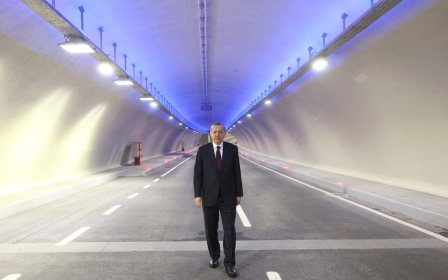Erdogan is declared winner of Turkey's presidential election

Turkish President Recep Tayyip Erdogan won tightly contested presidential polls, the election authority said on Monday, extending his 15-year grip on power as the opposition complained bitterly about the conduct of the vote count.
Turkish voters had for the first time cast ballots for both president and parliament in the snap polls, with Erdogan looking for a first round knockout and an overall majority for his ruling Justice and Development Party (AKP).
The stakes were particularly high as the president will be the first to enjoy enhanced powers, without even a prime minister, under a new constitution agreed in an April 2017 referendum strongly backed by Erdogan but which opponents say grants autocratic powers.
Erdogan defeated his nearest rival Muharrem Ince with an "absolute majority" of more than half the vote without needing a second round, said the chief of Turkey's election authority, Sadi Guven.
"I have been entrusted by the nation with the task and duties of the presidency," Erdogan said in a victory address at his Istanbul residence.
"Turkey has given a lesson in democracy to the entire world," he added, pointing to an 88 percent turnout.
The victory means Erdogan will almost certainly make good on his desire to become the country’s longest-ruling leader, surpassing Mustafa Kemal Ataturk, who founded the modern Turkish republic out of the ruins of the collapsed Ottoman Empire, the New York Times reported.
Under the new system brought in by last year’s referendum, Erdogan can run for a second term as president - and a third, if he were to call an early election - opening the possibility that he could stay in office until 2032, the Times noted.
Erdogan won 52.5 percent in the presidential poll while Ince, of the secular Republican People's Party (CHP), was at 31.5 percent, state-run Anadolu news agency said, based on a 99 percent vote count.
If confirmed, the figures would show Erdogan polling on a similar rating or even stronger than his 2014 election victory where he won his first mandate after more than a decade as prime minister.
Celebrations erupted outside Erdogan's residence in Istanbul and AKP headquarters in Ankara, with crowds of flag-waving supporters, AFP correspondents said.
Turkey will continue to "liberate Syrian lands" so that refugees can return to Syria safely, Erdogan said in an election victory speech early Monday.
Speaking to supporters from the balcony of his ruling AKP headquarters in Ankara after Sunday's presidential and parliamentary elections, Erdogan said Turkey would also act more decisively against terrorist organisations.
Parliamentary majority
The usually loquacious Ince remained silent, tweeting only that he would make a statement at 0900 GMT on Monday.
Trailing were Selahattin Demirtas of the pro-Kurdish Peoples' Democratic Party (HDP) with over eight percent in third and Meral Aksener of the nationalist (Iyi) Good Party with over seven percent.
Erdogan also declared victory in the parliamentary election, saying that the alliance led by the AKP and the Nationalist Movement Party (MHP) had won a majority in parliament.
A count of 99 percent of the votes showed that Erdogan's AKP and the MHP would win 293 and 50 seats respectively, enough for an easy majority in the 600-member chamber.
The HDP was polling 11.5 percent, well over the 10 percent minimum threshold needed, to win 67 seats, which would make the party the second-biggest opposition faction in the new chamber.
Celebrations erupted in the Kurdish-majority city of Diyarbakir, with people letting off fireworks into the sky, AFP correspondents said.
Its success is all the more remarkable given the HDP's Demirtas has campaigned from a jail cell after his November 2016 arrest on charges of links to outlawed Kurdish militants.
Erdogan had faced an energetic campaign by Ince, who has rivalled the incumbent's charisma and crowd-pulling on the campaign trail, as well as a strong opposition alliance in the legislative poll.
“The opposition parties ran surprisingly strong, energetic and competitive campaigns,” Amanda Sloat, an Obama administration official who is a senior fellow at the Brookings Institution, told the New York Times. “Parliament will be diverse, with the coalition system ensuring the representation of a wide range of parties — including the Kurds.”
But the CHP expressed unease over the conduct of the count, accusing Anadolu of being overly hasty in publishing results that favoured Erdogan.
Its spokesman Bulent Tezcan said Anadolu was publishing a count of over 90 percent of votes while in fact short of 40 percent had been counted.
Several world leaders supportive of Erdogan, including Azerbaijani President Ilham Aliyev and Qatari Emir Tamim bin Hamad al-Thani, called to congratulate him on his "victory," the presidency said.
Erdogan also warned anyone against casting doubt on the results: "I hope nobody will harm our country's democracy by casting a shadow on the election system and its results in order to disguise their failure."
Erdogan has overseen historic change in Turkey since his Islamic-rooted ruling party first came to power in 2002 after years of secular domination. But critics accuse the Turkish strongman, 64, of trampling on civil liberties and autocratic behaviour.
The president has for the last two years ruled under a state of emergency imposed in the wake of the 2016 failed coup, with tens of thousands arrested in an unprecedented crackdown which cranked up tensions with the West.
Erdogan has also campaigned against the backdrop of increasing economic woes, including high inflation and a currency that has sometimes been in free-fall.
Still, the Turkish lira was up more than 1 percent against the dollar after Erdogan and his ruling AKP claimed victory in presidential and parliamentary elections, overcoming the biggest electoral challenge to their rule in a decade and a half.
Turkey's lira, which has lost about a fifth of its value against the dollar this year, firmed on hopes of a stable working relationship between the president and the parliament.
Middle East Eye propose une couverture et une analyse indépendantes et incomparables du Moyen-Orient, de l’Afrique du Nord et d’autres régions du monde. Pour en savoir plus sur la reprise de ce contenu et les frais qui s’appliquent, veuillez remplir ce formulaire [en anglais]. Pour en savoir plus sur MEE, cliquez ici [en anglais].




